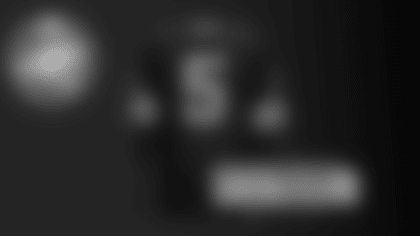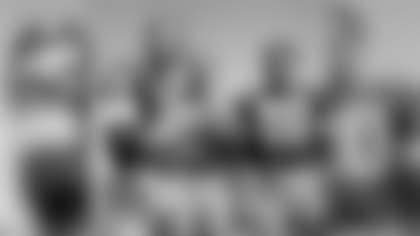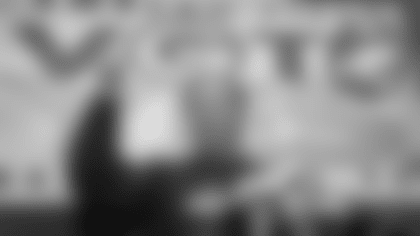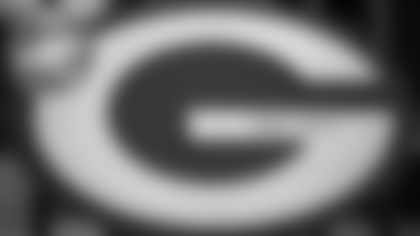Tony from West Olive, MI
The Packers under Vince Lombardi didn't play that well on Thanksgiving Day in Detroit. After the tie in 1963, they didn't play against the Lions on Thanksgiving for many years. I read, or think I did, this was Vince's doing. Is there any truth to that? By the way, I live along the shores of Lake Michigan, but as the crow flies I'm closer to Green Bay than Detroit. Proud to wear green and gold in Michigan!
That's true. Lombardi didn't like playing in Detroit on Thanksgiving and insisted that NFL commissioner Pete Rozelle find someone else to take the Packers' place. The Thanksgiving Day Packers-Lions series started in 1951 and continued through 1963. At the time, it was the NFL's only Thanksgiving Day game.Lombardi was coach for five of those games and the Packers were 2-2-1, but the Lions had more going for them than just home-field advantage. They finished second to the Packers in the Western Conference three straight years from 1960 to '62 and probably were the second best team in the league during that stretch. Lombardi also lost to the Lions at home in 1961 and won a squeaker in '62 on a last-second field goal.The Thanksgiving game everyone seems to remember was Green Bay's 1962 loss to the Lions, a 26-14 embarrassment. The Packers fell behind, 23-0, at halftime and Bart Starr ended up being dumped for a loss nine times for 83 yards.But that loss wasn't what prompted Lombardi to badger the league into finding another Thanksgiving Day opponent for the Lions. A year earlier, he voiced his objections to playing in the game, despite the Packers winning 17-9."The big reason I'm against it is because four days is not enough time to get ready for a game," Lombardi said in the dressing room at Tiger Stadium in 1961. "And now, with the new television contract, every club will receive the same amount. If we are to continue in this game, I feel we should receive additional revenue."Two days after the 1963 game, Rozelle announced the Packers would no longer be forced to play in Detroit every Thanksgiving. He said Western Conference teams would likely rotate as the opponent for the Lions, although the Cleveland Browns had expressed a willingness to take Green Bay's place.Then everything changed when Dallas was assigned a second Thanksgiving game starting in 1966. The Packers played in Dallas in 1970, but not again in Detroit on Thanksgiving until 1984.When the Packers played for the first time on Thanksgiving in 1951, it also was the first time they ever appeared in a nationally televised game. Obviously, that was a big deal in Green Bay. The game was broadcast on the DuMont Television Network and an estimated 24 million viewers were expected to tune in.Then again, mind-boggling as it might seem today, while the game was played in Detroit and broadcast coast-to-coast, it wasn't televised in Green Bay.The reason?Green Bay didn't have a TV station yet and wouldn't have one until 1953. The game was broadcast on WTMJ in Milwaukee and people with TVs in Green Bay were hoping their reception would be good enough to watch the game through the snow on the screen of their analog TV. Others planned to drive to Milwaukee and Sheboygan to watch it. But the vast percentage of fans in Green Bay probably had to settle for listening to it on radio station WJPG.Here's yet another storyline about that game.The capacity in 1951 of what was then named Briggs Stadium was just over 58,000, or more than enough seats to hold the entire city of Green Bay. Based on the 1950 census, Green Bay's population was 52,735.
Edward from Canton, SD
What was the last year the Packers ended the regular season in California, playing San Francisco and the LA Rams?
It was 1963, the same year the Thanksgiving Day tradition ended. The Packers finished with back-to-back games on the West Coast from 1950 to '63. Then for the next three years, they played their last game in either Los Angeles or San Francisco, but made two trips west.When the 1964 NFL schedule was announced and Lombardi learned the Packers would be playing in San Francisco on Nov. 15 and then going back to California to play the Rams on Dec. 13, he seemed to be as happy over that development as not playing in Detroit on Thanksgiving."We're the only ones who haven't gone out separately and it's time," said Lombardi.In the beginning, playing back-to-back games on the West Coast was probably a financial godsend for the Packers.As far as back as the 1920s, they often ended their season with an extended road trip and it was to their benefit. At that time, the Packers weren't able to sell enough tickets once the weather turned cold to stay in business. In their first 47 years, they played only three regular-season games in Green Bay during the month of December. Even playing in late November, especially during deer hunting season, would kill their gate in Green Bay.As for the back-to-back games against the Rams and 49ers, in six of the first seven years that the Packers ended their season with two games in California, they took the train there and back. Part of it was Gene Ronzani didn't like to fly over the mountains, but I think it can be safely assumed that flying twice to the West Coast, maybe even just once, would have sapped the Packers' cash reserves, at least in the early 1950s.
Scott from Greensburg, IN
On Monday night, Oct. 30, 1967, the Packers played the Cardinals in St. Louis. As a youngster my dad allowed my brother and me to stay up late and watch the game. It is a great memory from a very special season. My question is do you know what precipitated this game being on Monday night? My first thought was perhaps it had something to do with the baseball Cardinals being in the World Series – but that was long before postseason play went that far into October. Was this nationally televised? I assume it was for us to see it out of Indianapolis, which didn't have a pro football at the time. Was it on CBS, the NFL's network in those days? Was this game in any way a precursor to ABC's MNF, which began in 1970? Finally, were there other games played on Monday nights earlier or was this game unique?
Intriguing question. I can't tell you what was discussed in private among Rozelle, NFL owners and television execs, and whether there were visionaries who saw the potential for playing weeknight NFL games. But here's what I was able to research.It was the only Monday night game scheduled in 1967 and it was broadcast nationally by CBS. It also would be three years before Monday Night Football became a fixture on ABC.However, it also was the fourth year in a row that the St. Louis Cardinals were scheduled to play a Monday night home game.When the NFL schedule was announced in 1964, it called for the Cardinals to host the Baltimore Colts on Oct. 12. However, the game was later moved to Baltimore because the baseball Cardinals were in the World Series. As a result, the football Cardinals played eight road games and only six home games that year.The next two years, the Cardinals played their Monday night games, as scheduled. They met the Dallas Cowboys on Oct. 4, 1965, and the Chicago Bears on Oct. 31, 1966.The Packers also played a previous Monday night game at Detroit on Sept. 28, 1964.Before the 1964 season, the NFL signed a new lucrative, two-year television contract with CBS and added two highly attractive nationally televised games on the final two Saturday afternoons of the season: Green Bay at the Chicago Bears on Dec. 5 and Cleveland at the New York Giants on Dec. 12.The Monday night Packers-Lions game and Colts-Cardinals game were not scheduled for national television. Apparently, baseball dictated those dates.The Lions-Packers game was the third week of the season and the Lions started with two road games. The Green Bay Press-Gazette reported when the schedule came out that the Lions wanted to play on Sunday, Sept. 27, but the Detroit Tigers had a game scheduled for Tiger Stadium that day and so the Lions had to play on Monday night if they wanted a home game that weekend.The Colts-Cardinals game was scheduled for the fifth week and was to be the Cardinals' home opener. When the schedule was announced, the St. Louis Post-Dispatch explained that the baseball Cardinals wouldn't close their regular season in Busch Stadium until Oct. 4 and, thus, workers needed the extra time to install the added seats needed for the football Cardinals. Otherwise, they would have to play on the road for a fifth straight week and, as it turned out, that's exactly what happened. Because of the World Series, the football Cardinals not only lost a home game, but played their first five games of a 14-game schedule away from home.In 1965, the Post-Dispatch reported the Cowboys-Cardinals game was scheduled for Monday night, rather than Sunday afternoon, to avoid a conflict with dedication ceremonies for St. Louis' riverfront arch. That game wasn't scheduled for national television, either.The tune changed in 1966.Before the game between the Cardinals and Bears, George Strickler, who had worked in the NFL office in the 1940s, wrote in the Chicago Tribune that the game was "part payment to (CBS) for those million dollar checks CBS passes around to league members these days."Thus, I would assume the same was true of the Packers-Cardinals game the next year.That said, I also sense the Cardinals might have believed they were establishing a profitable tradition with an annual Monday night home game. They weren't selling out their games at the time and their Monday night games in 1965 and '66 drew their second-largest crowd each season. The 1967 Packers-Cardinals contest attracted 49,792 fans, the Cardinals' largest crowd of the season. Their home opener against the New York Giants that year drew only 40,801.
Willie from Hayward, WI
Bill Curry started at center for the Packers in Super Bowl I. In the second quarter when the Packers scored their second touchdown, Ken Bowman was playing center, but Curry snapped for the extra point. What happened?
Curry sprained his ankle and basically took himself out of the game. In 2016, prior to Super Bowl 50, Curry told the Columbus Dispatch, "I left the game, and in the NFL, we all know the code: You don't leave big games."Curry said Lombardi never said a word to him, but exposed him in the expansion draft a month later. New Orleans, in turn, selected Curry.The 1966 season was Curry's second and he started all 14 regular-season games at center, plus the NFL championship in Dallas and the first Super Bowl. He replaced Bowman, who had dislocated his right shoulder in the preseason. As a rookie in 1964, Bowman had taken over as the Packers' starting center in the eighth game. He remained the starter throughout the Packers' 1965 championship season.While Bowman remained on the roster during the 1966 season as Curry's backup, his shoulder was never right, even when he replaced Curry in the Super Bowl. The day after the game, Lombardi was asked why he subbed for Curry and he had nothing but high praise for Bowman."Bowman deserves a lot of credit," Lombardi told reporters. "You know he has a dislocated shoulder that pops out frequently… Fortunately, the shoulder only popped out once yesterday. It was easily put back."Bowman subsequently underwent surgery in the offseason and started nine regular-season games and three postseason games, including Super Bowl II, when the Packers repeated as champions in 1967.
Mark from Appleton, WI
I was a 12-year-old living in Appleton when the Ice Bowl was played. I believe I saw it on live TV, black and white for us. Is my memory incorrect? Your statement that the Green Bay market was blacked out does not ring correctly – or maybe Appleton did not fall into the Green Bay market? We watched on Channel 2 – WBAY TV. Thank you for any clarification.
The game was blacked out in Green Bay. It was televised exclusively by CBS and shown to 99.5% of its viewing audience. The only two markets in the country that were prevented from broadcasting it, per NFL rules of the day, were Green Bay, where WBAY was the CBS affiliate, and Wausau.That said, if you have recollections of watching the game, maybe you did. WISN, Channel 12 in Milwaukee, aired the game and you'd know better than I if you could view Milwaukee channels in Appleton when you were a kid. I can tell you this: The Post-Crescent, Appleton's daily newspaper, carried Channel 12's listings in its TV section. Plus, Sabre Lanes in Appleton ran ads before the game telling people they'd be showing it on TV. Presumably, it was able to pick up a Milwaukee station. So maybe there was a way of watching it in your home in Appleton.Here's another possibility. The Post-Crescent's TV listings noted films of the game were going to be shown on Green Bay's Channel 2 at 4 p.m. Monday, the day after the game. That was New Year's Day so it might have seemed like Sunday for at least some of the people who watched what I presume was a replay of some sort.















